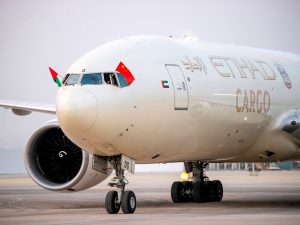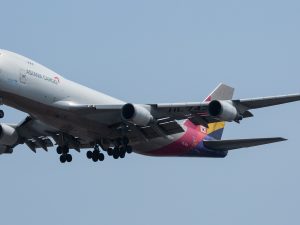Ethiopian Cargo & Logistics Services is adding Casablanca, Morocco to its freighter services. The carrier said in a LinkedIn post on January 4 that it “has finalized preparations to launch freighter services to Casablanca, Morocco”. Ethiopian Cargo added that it will begin operations to Casablanca on January 9. The airline has not specified what aircraft will be used, or the frequency and schedule of the route. Ethiopian Cargo & Logistics Services, operates to more than 60 destinations in Africa. The company carries out the transportation of special cargo like medical products, live animals and perishable products.
Read More »Etihad Cargo records growth ad e-com demand surges
Etihad Cargo witnessed growth due to rising e-commerce and electronics demand and the airline is hoping its new relationships covering the sector will help boost performance this year, said Leonard Rodrigues, acting manager director, head of revenue management & network planning, adding that much of the rise in demand from e-commerce and electronics companies was driven by increased volumes of new smartphone models. The airline was able to meet this demand with dedicated freighter charters. “Etihad Cargo reserves freighter availability for these projects so that we have the capability to fully meet demand,” he said in reports. “This combined with our express and e-commerce capabilities, our efficiency in handling this type of cargo and Abu Dhabi’s strategic geographical location makes Abu Dhabi International Airport an ideal hub location for the transit of these charters.” Rodrigues also pointed to Etihad’s recent reciprocal blockspace agreement with Chinese express carrier SF Airlines as an example of how it had partnered with firms to meet demand for e-commerce. The partnership saw Etihad add flights to SF Airlines’ Ezhou hub and therefore improve connectivity with China’s five national-level city clusters and 25 domestic destinations via the airport’s transportation infrastructure, including railway, waterway, expressway and air links.
Read More »ACAAI, ACFI meet MoCA to discuss eKYC, digital invoice issue
The Air Cargo Agents Association of India (ACAAI) and Air Cargo Forum India (ACFI) held a meeting with Shri General V K Singh, MoS, Shri Vumlunmang Vualnam, Secretary MoCA and Shri Piyush Srivastava, Senior Economic Advisor at Ministry of Civil Aviation (MoCA) to focus on the issues regarding the eKYC and digital invoice issue. “With uniform eKYC in place, exporters or importers do not need to register at every individual port. Also when the exporter is uploading the invoice for GST, the data should be captured and used by customs so as to reduce the carbon footprint and not using paper, ACAAI and ACFI members raised the concern. The meeting was attended by ACAAI and ACFI members including President, CK Govil, Secretary Vikram Kumar, K S Kunwar, Secretary General, ACFI, Arun Kumar ACFI and Rajiv Khanna ACFI.
Read More »Kuehne+Nagel offers carbon insetting to push fleet electrification
Kuehne+Nagel announced the launch of its Book & Claim insetting solution for electric vehicles, making Kuehne+Nagel the first logistics service provider to launch the solution, which previously was limited to low-emission fuels. “Implementing decarbonisation solutions and helping customers achieve their sustainability goals is a key component of Kuehne+Nagel’s Roadmap 2026 Living ESG cornerstone,” says an official release. Kuehne+Nagel launched an insetting solution for hydrotreated vegetable oil (HVO) last October, which is now followed by electric vehicles, the release added. “The first-of-its-kind solution has been tested and validated in cooperation with leading external stakeholders.” Hansjörg Rodi, Member of Management Board responsible for road logistics, Kuehne+Nagel says: “We see battery-electric vehicles (BEVs) as the future to reduce emissions in road freight. Carbon insetting supports the scale-up of low-emission solutions like BEVs and helps to reduce the premium that customers pay for these solutions, thereby supporting the decarbonisation of road transport.”
Read More »Airfreight rates surge of last 3 months decline
The peak season surge in air freight rates of the past three months appears to have come to an end according to the latest data from TAC Index, the price reporting agency (PRA) for air freight markets. The overall Baltic Air Freight Index suddenly fell by -20 percent over the two weeks to 1 January, putting it down by -31 percent over the past 12 months. “Like the previous rise in rates, the sudden drop was heavily skewed by falling rates out of China, with every lane tracked from Hong Kong and Shanghai heading lower,” reads the report. The index for outbound Hong Kong routes was down -23 percent over two weeks putting it back in negative territory YoY by -15 percent. Outbound Shanghai fell even more steeply, pushing to a fall YoY of -30 percent. Sources suggested the sudden drop probably reflected a drop in spot market volumes – leaving a higher proportion of business conducted at previously agreed (lower) contract levels. Rates from elsewhere in Asia were not falling so much WoW – and indeed higher on lanes to Europe from Vietnam, Bangkok and India.
Read More »Experts predict Uncertainty & Opportunity in global air cargo
Geopolitical uncertainty and unpredictability could fuel demand for air cargo as shippers move to benefit from the stability of services. Figures from data provider Xeneta show that air cargo demand increased by 9% year on year in December – although this is partly a reflection of a weak end to 2022 – while spot rates reached their highest level in nine months of $2.60 per kg and the dynamic load factor increased by 3% to reach 59%. And Xeneta chief airfreight officer Niall van de Wouw said this could mark the start of a new cycle for air cargo, with shippers likely to appreciate stability returning to the market allowing them to “more accurately predict the transportation costs for the products they are selling”. He pointed out the ocean freight market is facing disruption due to attacks in the Red Sea. Van de Wouw said: “There’s still a lot of friction in the global supply chain market and that means there will be opportunities for some sectors. If big ocean carriers are not going through the Red Sea, it might delay a million or more containers, with all the knock-on effects. “And the fact that you don’t know how long this situation will continue means some shippers will pay for the predictability of air cargo to lessen the impact of the current ocean freight disruption.
Read More »‘AI-driven innovations to streamline logistics, optimize routes in 2024’
Kartik Sharma, AI Expert shares, “In 2024, the air cargo industry is poised for a transformative leap with AI at its helm. AI-driven innovations streamline logistics, optimizing routes, and enhancing operational efficiency. Predictive analytics minimize delays, maximizing on-time deliveries. Smart warehouses leverage AI for automated sorting and handling, reducing errors. This synergy of AI and air cargo signifies a promising era of faster, cost-effective, and eco-friendly transport. Embracing this evolution, I am optimistic about AI’s role in propelling the industry forward, revolutionizing global trade and connectivity while fostering a sustainable future for air cargo in 2024 and beyond.”
Read More »India will take key position in South Asia as a hub: ACFI
Yashpal Sharma, President, Air Cargo Forum India (ACFI) shares, “2024 will see India take a key position in South Asia as a hub. We are confident that the Government is going to very soon bring regulatory changes to the processes to facilitate this. We do expect a higher level of digital penetration across all stakeholders to bring better speed and efficiency for air cargo. The year gone by was a re-set year post pandemic for most economies of the world. ACFI has also played an active role in bringing all stakeholders together and also addressing key industry issues to the Government and other regulators.”
Read More »Korean Air targets completion of Asiana acquisition in 2024
Korean Air said it expects to complete the acquisition of Asiana Airlines this year, as it acknowledged that the process had “taken much longer than expected”. In a message to employees on New Year’s Day, airline chief Walter Cho said he is “confident” the merger – first announced in November 2020 amid the Covid-19 pandemic – will finalise this year. The integrated airline will “be a tremendous growth engine for us in the long run”, Cho added, urging employees to “work together” in its launch. “Korean Air will be poised to stand shoulder to shoulder with global leading airlines. The merger will optimise our network and allow us to operate to new destinations, so that we may offer customers more choices.” Last month, European Union competition regulators set a February deadline to review Korean Air’s proposed acquisition of Asiana Airlines. The two airlines last year gained board approval to sell the cargo business of Asiana Airlines to offset concerns about the market share the combined entity would have on the Korea-Europe trade lane. While the acquisition has gained approvals from several regulators, including in Singapore, the UK and China, it has faltered in major jurisdictions such as the EU, USA and Japan.
Read More »Global air cargo tonnages for Dec 2023 up 5% YOY
As global air cargo tonnages for December 2023 are expected to be up five percent year-on-year, Q4 will be the first quarter of 2023 showing positive growth (up three percent) compared to last year, coming from Q1 at -11 percent, Q2 (down eight percent) and Q3 (down three percent) despite all uncertainties in the last months. “This means that global tonnages for the full year 2023 end up being five percent lower than in 2022,” says the latest update from WorldACD Market Data. “While the first half of 2023 was down nine percent, the second half was characterised by an improving YoY performance for each consecutive month and closing at flat YoY growth.” Weekly analysisPreliminary figures for week 51 (December 18-24) show a drop of eight percent in global tonnages and a decline of six percent in average worldwide rates compared with the previous week after recovering more quickly than last year from the seasonal post-Thanksgiving dip last month. “This slide in tonnages and rates follows the typical pattern seen in the second half of December,” the update added. Comparing weeks 50 and 51 this year with the preceding two weeks (2Wo2W), overall tonnages decreased four percent, and overall global average rates were down three percent with capacity up one percent. “While volumes went down across all regions, we saw that the global decrease in average rates has mainly been driven by origin region Asia Pacific (down six percent) that recently showed a surge in rates, especially China.” On a regional level, a drop of 15 percent in tonnages was recorded on key flows ex-Asia Pacific to Europe, ex-North America to Europe and ex-Europe to Africa, the update added. “On …
Read More » Cargo Breaking News
Cargo Breaking News








